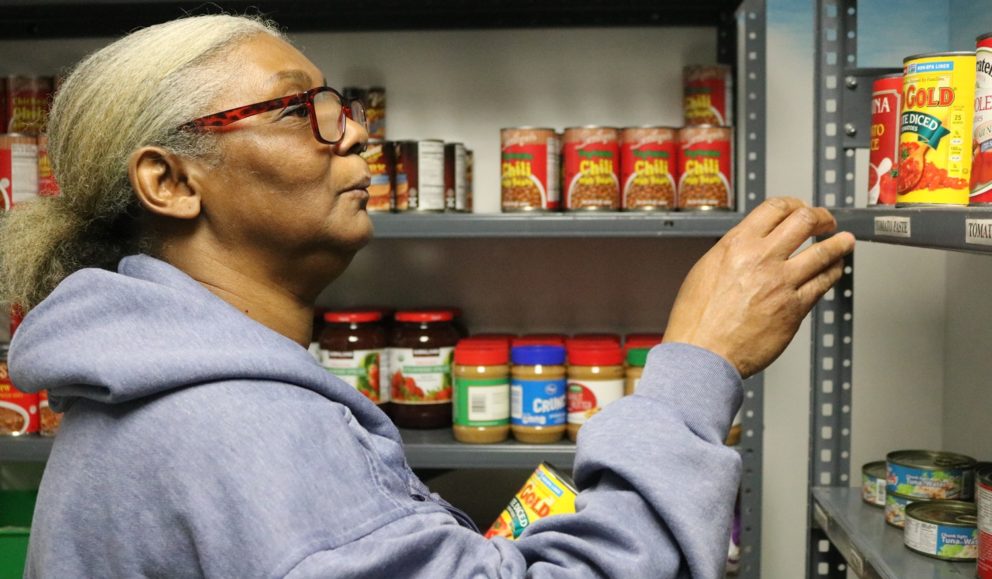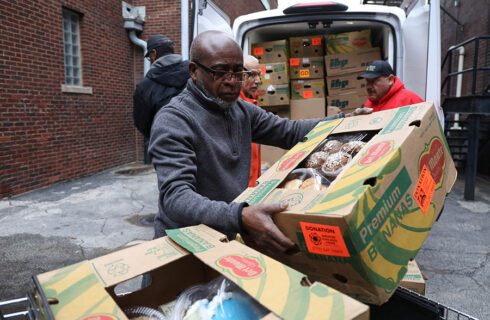The stereotypes of people receiving Supplemental Nutrition Assistance Program (SNAP) benefits are increasingly prevalent.
These stereotypes say that people are lazy, or are gaming the system. But, dig a little further and it’s not hard to uncover a reality many fail to acknowledge: the faces of SNAP are much more familiar than one might expect. They are families, working individuals, veterans, children and older adults.
The face of SNAP is, largely, the face of those who are doing their best but are still struggling to make ends meet.
As the threat of cuts to SNAP loom, it is important to share the stories of those benefiting from the program. Because the best way to overcome the misguided stereotypes of SNAP recipients is to simply debunk them with real-life accounts of the power the program has to change lives.
Stories like that of Angela White (pictured above), who worked her entire adult life at a typesetting company in Schaumburg. She always wanted to work. She had a career and never expected that to change. But it did. Angela, 63, was diagnosed with hyperthyroidism a few years ago.
“I could barely hold a job because of the health issues that came with my condition,” she admitted.
Without a steady income for the first time in her life, Angela faced an unfamiliar challenge: not having enough money to afford food. So, she applied for SNAP benefits and receives $180 per month.
“If I didn’t have the money from SNAP, there would barely be anything to eat in my house,” she said. “I am healthier because of the food I get from SNAP.”
The program has been there for Angela when she needed it most to afford fresh fruit, vegetables and protein. That’s SNAP’s job.
“SNAP helps families to bridge temporary periods of unemployment or a family crisis,” writes the Center on Budget and Policy Priorities. “If a parent loses her job or has a job that pays low wages, SNAP can help her feed her children until she is able to improve her circumstances.”
And that’s exactly how Cory Benjamin-Evans and her family used SNAP. Cory stays home to take care of her eight, five and three-year-old children – two of whom have disabilities. So, when her husband lost his job in early 2016, money was tight for the family.
While her husband worked various temporary jobs to keep the family afloat, they were receiving SNAP benefits.
“SNAP enabled me to send the kids to school with healthy food – fresh fruit, veggies and whole grains,” she said.
Recently, Cory’s husband got a full-time job in customer service. With his new income, the family will no longer qualify for benefits – and they don’t need them anymore.
“That money was really important for our family when we had it,” Cory said.

Rafael Rosario with his daughter Caridad
For Cory and her family, SNAP was a lifeline when they needed it. And sometimes, SNAP is a lifeline for those who have put their liveson the line.
Rafael Rosario received two Purple Heart medals for combat wounds he sustained during his time as a soldier in the U.S. Army in Afghanistan. He was on active duty until 2013, but ever since, his injuries have prevented him from working.
His wife, also a veteran, is working, but the family’s budget is tight with only one income. They receive SNAP benefits, and use them to make sure their young daughter, Caridad, has enough nutritious food to eat.
“They help us afford the best food,” he said. “It’s an incredible relief.”
Rafael. Cory. Angela. They are hard-working individuals and families who are trying every day to better their lives and stay healthy. SNAP is helping them – and hundreds of thousands of Illinoisans each year – build a firm foundation on which they can succeed. They aren’t the exception; they are the face of SNAP.
To learn more about the Food Depository’s advocacy work and the impact of cuts to SNAP, visit chicagosfoodbank.org/advocacy.
Share This Post




